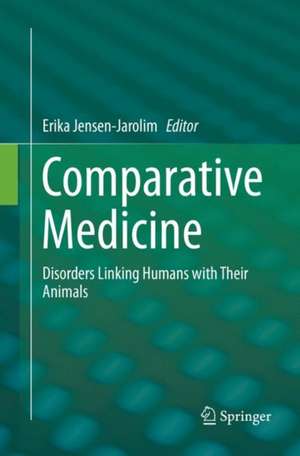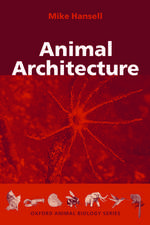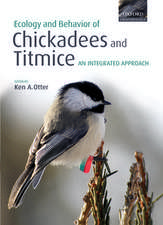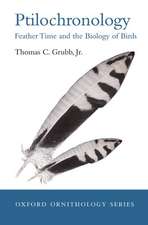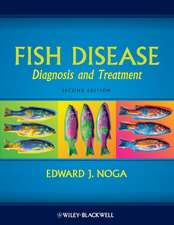Comparative Medicine: Disorders Linking Humans with Their Animals
Editat de Erika Jensen-Jarolimen Limba Engleză Paperback – 16 iul 2018
The reader - whether expert or interested lay - can thus directly compare between human and animal patients. The animal patient thereby represents a natural disease model, which besides the experimental models, is urgently needed to improve the therapeutic options for both humans and animals.
| Toate formatele și edițiile | Preț | Express |
|---|---|---|
| Paperback (2) | 729.12 lei 38-44 zile | |
| Springer International Publishing – 16 iul 2018 | 729.12 lei 38-44 zile | |
| SPRINGER VIENNA – 22 aug 2016 | 945.47 lei 6-8 săpt. | |
| Hardback (2) | 745.91 lei 38-44 zile | |
| Springer International Publishing – 8 feb 2017 | 745.91 lei 38-44 zile | |
| SPRINGER VIENNA – 18 dec 2013 | 951.59 lei 6-8 săpt. |
Preț: 729.12 lei
Preț vechi: 959.37 lei
-24% Nou
Puncte Express: 1094
Preț estimativ în valută:
139.52€ • 144.16$ • 116.06£
139.52€ • 144.16$ • 116.06£
Carte tipărită la comandă
Livrare economică 15-21 martie
Preluare comenzi: 021 569.72.76
Specificații
ISBN-13: 9783319836362
ISBN-10: 3319836366
Pagini: 230
Ilustrații: XIX, 230 p. 24 illus., 22 illus. in color.
Dimensiuni: 155 x 235 mm
Greutate: 0 kg
Ediția:Softcover reprint of the original 1st ed. 2017
Editura: Springer International Publishing
Colecția Springer
Locul publicării:Cham, Switzerland
ISBN-10: 3319836366
Pagini: 230
Ilustrații: XIX, 230 p. 24 illus., 22 illus. in color.
Dimensiuni: 155 x 235 mm
Greutate: 0 kg
Ediția:Softcover reprint of the original 1st ed. 2017
Editura: Springer International Publishing
Colecția Springer
Locul publicării:Cham, Switzerland
Cuprins
1.Diseases of the Nervous System (Josef Finsterer, Monika Bradl).- 2.Diseases of the Circulatory System (Claudia Stöllberger, Ivo Volf).- 3.Diseases of the Kidneys (Renate Kain, Maximilian Pagitz).- 4.Diseases of the Gastrointestinal tract (Nicole Luckschander).- 5.Diseases of the Lung (Karin Hufnagl, Franziska Roth-Walter).- 6.Diseases of Skeleton and Bones (Wolfgang Sipos, Peter Pietschmann).- 7.Diseases of Reproduction (Christine Aurich, Isabella Ellinger).- 8.Diseases of the Endocrine System (Florian Zeugswetter).- 9.Diseases of Stress (Lisa-Maria Glenk).- 10.Diseases of Immunity (Franziska Roth-Walter, Erika Jensen-Jarolim).- 11.Diseases of the Skin (tba).- 12.Diseases of Viral infections (Reinhard Kirnbauer, Sabine Brandt, Edmund Hainisch).- 13.Diseases of Bacterial Infections (Gerold Stanek).-14.Diseases of Protozoal infections (Julia Walochnik).- 15.Diseases of Parasitic infections (Herbert Auer, Anja Joachim).- 16.Principles of Animal Law in Medicinal Research (Regina Binder).- 17.Ethics in Medical Research (Herwig Grimm).
Recenzii
“Covering a subset of diseases that occur in humans and animals, this book compares disease presentation, diagnosis, and therapy focusing on dogs, cats, horses, and humans. … The purpose is to provide a link between clinical and veterinary disciplines to expand how we look at different diseases. … This book would be most useful for medical or veterinary students, residents, practitioners, and research faculty. … On the whole, the goal of this book is achieved.” (Sarah Freemantle, Doody's Book Reviews, May, 2017)
Notă biografică
Prof. Erika Jensen-Jarolim is head of the Dept. of Pathophysiology of the Medical University Vienna. She holds an MD and is specialized in pathophysiology and immunology. Based on her active interest in comparative oncology she since 2008 is councilor of the University of Veterinary Medicine Vienna. Her research is dedicated to comparative strategies in order to simultaneously speed up diagnostic and therapeutic developments for human and animal patients, especially in the allergy and oncology fields.
Textul de pe ultima copertă
This book highlights the most significant diseases for humans and their dogs, cats and horses. The examples discussed, which include allergies, osteoporosis, cancer and many more, illustrate that humans and their companion animals may in fact develop similar diseases.
The reader - whether expert or interested lay - can thus directly compare between human and animal patients. The animal patient thereby represents a natural disease model, which besides the experimental models, is urgently needed to improve the therapeutic options for both humans and animals.
The reader - whether expert or interested lay - can thus directly compare between human and animal patients. The animal patient thereby represents a natural disease model, which besides the experimental models, is urgently needed to improve the therapeutic options for both humans and animals.
Caracteristici
Provides an overview on the pathophysiology of common diseases in human and selected model animals
Introduces new concepts in comparative medicine
Critically discusses the need of animal experimental models for understanding the molecular mechanisms of human diseases
Introduces new concepts in comparative medicine
Critically discusses the need of animal experimental models for understanding the molecular mechanisms of human diseases
